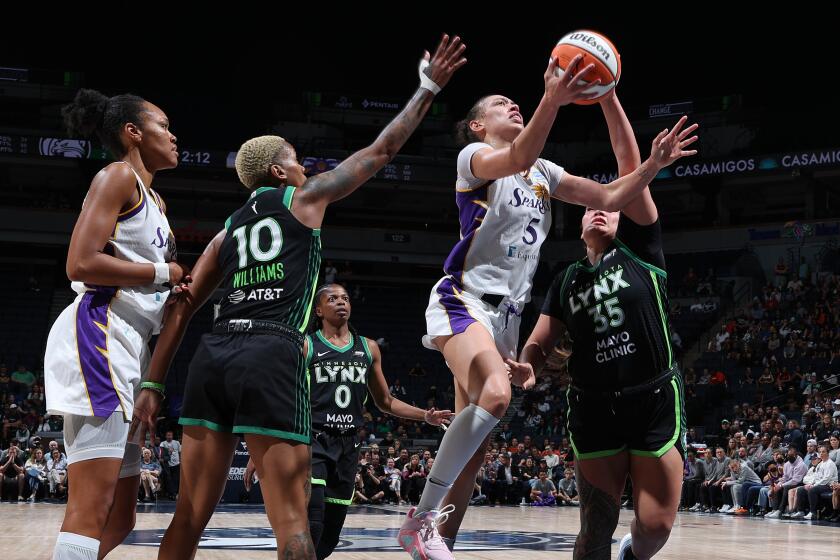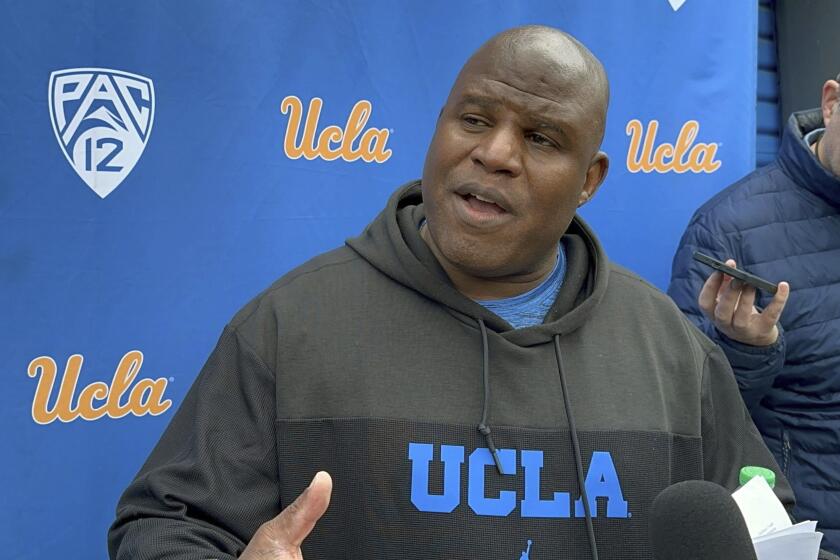This Time, Slaney Runs Budd Into the Ground
No collision, no tangling of feet, no sobbing, no raging against the night, no pulling of hair, no calling of names.
No drama.
Just a race. And not a very good one at that.
The long-awaited and much-hyped rematch between those star-crossed Olympians, Mary Decker Slaney and Zola Budd, went the only way it could. Slaney ran to the front in the 3,000-meter contest at the half-filled Crystal Palace and raced Budd into the ground.
Slaney didn’t trip, which was all that could have saved this made-for-TV extravaganza, promoted with all the style and subtlety of Hulk Hogan vs. Rowdy Roddy Piper.
Slaney’s time of 8:32.91 was the best in the world this year. Little Zola Budd, who had hugged Slaney’s shoulder for five laps, finished a struggling fourth, at 8:45.43, perhaps 80 yards off the lead.
In the Olympics, Budd finished seventh in 8:48.80, while gold-medalist Maricica Puica of Romania was timed in 8:35.96.
After Saturday’s race, both Slaney and Budd shook hands, congratulated each other, did everything but hug.
Before the race, they wished each other well.
“I wished her luck,” Slaney said. “I didn’t want her to be afraid of me.”
It was over, they said. No hard feelings, they said. Mary was very forgiving. Zola was very relieved.
“I think all that has happened between us is in the past,” said Budd, who cried her way around the track, lap after tear-stained lap, that night 11 months ago in the Coliseum. “I think the pressure is off.”
There should be no rematch. Tex Cobb wanted no more of Larry Holmes. But anyone familiar with track expected Slaney to crush Budd, a 19-year-old still trying to find her way. Budd was among those saying she had no chance to win.
She had no chance. Budd had been losing to runners all over Europe, losing three times in the last month alone. What chance against Slaney?
Still, she went out after Slaney, two or three times attempting to pass her. Five laps into the race, she began to slip back. Cornelia Burki of Switzerland and Ingrid Kristiansen of Norway passed her and finished second and third, respectively.
“I just wanted to keep up with the front-runners and see what would happen at the end,” Budd said. “After five laps, it just wasn’t there any more.”
Slaney pulled steadily away and said afterward that she didn’t consider the race a rematch.
“Just a race,” she said.
There were about 9,000 people at the Crystal Palace watching the tail end of a track meet. Certainly, the night bore no resemblance to the drama of that Los Angeles night and a stunned 90,000 people at the Coliseum. Few who saw it will forget it--Slaney running over Budd’s bare feet, Slaney swiping at the air, grabbing Budd’s number, falling to the ground, trying to rise but failing. A gold medal that might have been slipped away.
Slaney cried that night, railing at Budd, calling her at fault, and cursing her when she tried to apologize.
Not only did Slaney lose a possible gold that night, she lost her place as America’s sweetheart. They called her a whiner, Mary Weeper.
As she lay on the ground that night, she was heard to say, “Zola Budd did this to me.”
Eleven months later, Slaney was all warmth and smiles.
“I’m hoping it’s over . . . all the controversy,” Slaney said after the race. “We were able to go out on the track. People saw I didn’t have any vendetta against her, and she doesn’t hate me.”
People also saw something of what might have been, had Slaney not fallen that night. They might have seen more if Puica, the Olympic champion, had been here. Or if any of the top three Olympic finishers had been here.
No one wanted Puica, not ABC-TV, which conceived the event, or the meet promoter. Budd and Slaney were each paid a reported $25,000 to run here. Puica was offered $2,000.
“For her (Puica’s) sake, I wish she was here,” said Wendy Sly, the Olympic silver medalist who is out with a knee injury.
Slaney’s time was three seconds faster than Puica’s winning Olympic time, but a few seconds slower than Slaney had wanted to run on a cold and windy midsummer’s night.
“This didn’t prove anything,” Slaney said. “Puica is the Olympic champion, and you can’t change that. This race means nothing except that I’m in pretty good shape.”
She looked like the world has long come to expect Slaney to look. She took the lead from the gun, avoiding Budd’s bare feet. At two laps, Budd, a few strides behind, moved up against Slaney’s shoulder. Budd, who likes to run in front, couldn’t get there.
And so along went Mary, pulling steadily away and away, making a non-race of it, which suited Slaney fine.
Her life may be good again, but Budd’s is far from settled. She is not the racing sensation she was thought to be when she left South Africa for Britain. She has been haunted by that Olympic race. She is still bothered by anti-apartheid protesters, and one scaled the fence Friday night to drop pamphlets on the Crystal Palace track.
Before the race, a Times of London columnist said Britain was the “Liberia of nations” for taking Budd in.
Budd, looking too thin, too frail, seems to have much work ahead of her before the likes of Slaney will ever consider her competition again.
“I don’t think Mary is worried about Zola,” Wendy Sly said before the race.
Before the race, Slaney had said: “I can forgive but I can’t forget.”
Now she may never have to worry about her again.
More to Read
Go beyond the scoreboard
Get the latest on L.A.'s teams in the daily Sports Report newsletter.
You may occasionally receive promotional content from the Los Angeles Times.










